WATCH ALL EPISODES OF LEGENDS: THE SERIES, SEASON 4
EPISODE ONE - THE LEGEND OF ERIC MEDLEN
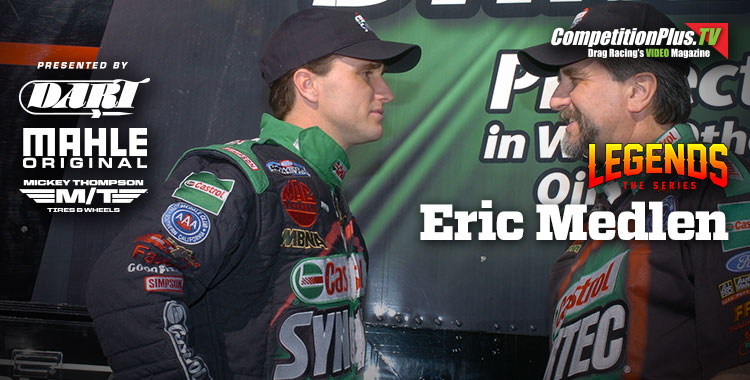 It’s been ten-and-a-half years since a freak accident during what should have been a routine test session took the life of rising Funny Car star Eric Medlen and put into motion a father’s quest to transform personal tragedy into meaningful change in race car design.
It’s been ten-and-a-half years since a freak accident during what should have been a routine test session took the life of rising Funny Car star Eric Medlen and put into motion a father’s quest to transform personal tragedy into meaningful change in race car design.
In this, the debut episode of Legends: The Series, Season Four, John Medlen talks about his son’s passion for life, his affinity for people and how his pursuit of a dream ultimately landed him in the seat of one of the world’s most powerful race cars and made him a six-time NHRA tour winner. “
(Driving) was something he wanted to do very, very, very bad,” Medlen said of his son, who was just three races into his fourth pro season when he died at age 33. “I did everything I could to talk him out of it (but) I could see that’s where his heart was. That’s what he wanted to do.” Nevertheless, overcoming his own grief in the aftermath of the accident was a slow and very painful process, one in which he insists Eric played a major role.
“We all get to choose the path we take in life,” he said. “You’ve gotta make the best decisions you can, but it’s your life. It’s a time that God has given us on this planet and you get to pick. We have an arrival date and an ending date and there’s a dash between it all. We get to pick how we live that dash. (Eric) was a perfect example of living (that dash) to the fullest."
EPISODE TWO - THE LEGEND OF JEB ALLEN
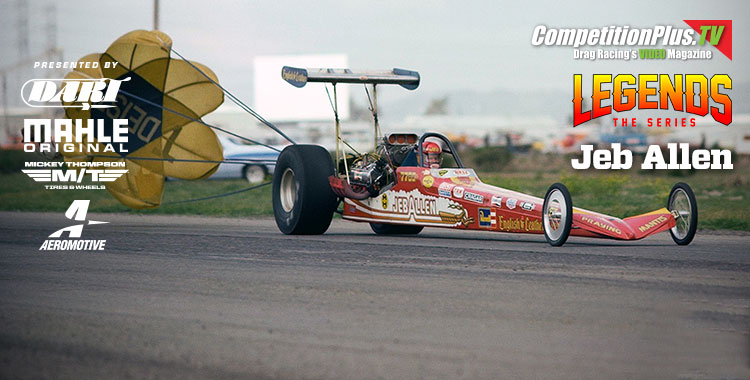 Few ever climbed higher or sunk lower than Jeb Allen who, six years after becoming the youngest driver ever to win the NHRA Top Fuel Championship, was addicted to drugs and alcohol, estranged from family and friends and living in the back of his truck.
Few ever climbed higher or sunk lower than Jeb Allen who, six years after becoming the youngest driver ever to win the NHRA Top Fuel Championship, was addicted to drugs and alcohol, estranged from family and friends and living in the back of his truck.
In this episode of Legends: The Series, Season Four, Allen, now a successful homebuilder, revisits the good days, discusses the bad and explains how “tough love” finally enabled him to break the cycle of abuse.
A crew chief at 16, the youngest licensed NHRA Top Fuel driver at 17 and the youngest Top Fuel winner at 18, he raced with sponsorship from Revell, Dodge and English Leather. He won NHRA, AHRA and IHRA championships. Eventually, though, the pressure he placed on himself took its toll.
“I said I’m gonna be the best or I’m gonna go broke doing it,” he recalls. “Well, I won three championships – and I went broke.”
When sponsorship became an issue, Allen turned to booze and drugs and “drifted off into space for several years.
“When you’re an addict, you’re the last one to know,” he said. “Don Garlits lost respect for me towards the end, as many people did. I was drinking quite a bit. I’d have two beers on the way back down the return road whether I lost or not.”
Allen hit bottom when he drove to his parents’ home one day and was told that his dad was hiding in the closet because he didn’t want to see his youngest son. That was too much for someone to whom family meant so much.
“I took all the drugs I had,” Allen said, “(and) when they ran out, I checked myself into a rehab facility.”
And decades later, the former poster boy for drag racing now serves as a reminder of how strength and determination can overcome even the most crippling addiction.
EPISODE THREE - THE LEGEND OF JOHN FORCE
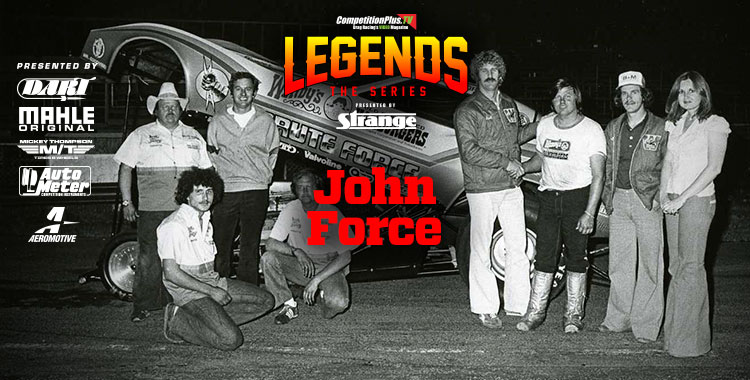 John Force’s incredible success as a professional drag racer belies a childhood in which he rarely won anything – from football to fistfights.
John Force’s incredible success as a professional drag racer belies a childhood in which he rarely won anything – from football to fistfights.
In this episode of Legends, the Series, season four, the 16-time Funny Car champ talks about enduring polio, the influence of his brother Louie, his family’s “Grapes of Wrath” lifestyle, a father whose pride was not evident until after his death, learning to deal with pressure and how he would most like to be remembered.
“I didn’t know I was a poor child,” the 148-time NHRA tour winner said of his years growing up in seven-member family anchored by a truck driving dad and a fry cook mom. “I thought it was the greatest time of my life.”
He recalls that when he began his drag racing career armed with little more than a big mouth and a dream, whenever he went out the door “my mom would slip me a check and say, ‘don’t tell your dad’ and my dad would slip me a credit card and say, ‘don’t tell your mom.’” He told neither.
He remembers his dad as “a mean guy, but a good man,” fondly recalls the person who sent over a bottle of champagne after his breakthrough win in Canada and observes that when you throw up on someone who’s trying to beat you up, “it kind of ruins the thrill of the fight.”
Finally, he admits that “I hate it when someone is mad at me. I hate it. I go and try to fix it, but you can’t fix the world.”
Not that he isn’t trying. Enjoy as an American icon talks about life’s lessons.
EPISODE FOUR - THE LEGEND OF WARREN JOHNSON
 Warren Johnson won 97 national events and six championships at the wheel of a series of Chevrolets and Oldsmobiles during the golden age of NHRA Pro Stock racing. Yet, even though he has hoisted more NHRA trophies than any pro racer with the exception of John Force, he never fancied himself a driver.
Warren Johnson won 97 national events and six championships at the wheel of a series of Chevrolets and Oldsmobiles during the golden age of NHRA Pro Stock racing. Yet, even though he has hoisted more NHRA trophies than any pro racer with the exception of John Force, he never fancied himself a driver.
In this episode of Legends, the Series, season four, WJ gets candid about his career and those who helped shape it, from Dr. Zook to Bob Glidden, talks about being “vertically challenged” and explains his simple philosophy of life.
“If somebody wants to know something, just ask me,” he said. “I’ll give you an honest answer, at least from my perspective. It might not necessarily be right (but) I try to be as honest as I possibly can.
“I came from a frugal background,” he said of his years growing up on a northern Minnesota farm. “We had to repair everything ourselves, my brother and myself. That’s where I got my work ethic. (We) just worked till we got the job done.”
Johnson also learned car control racing on the ice and snow. It’s a skill that would serve him well in a driving career spanning four decades although he admits that he “probably should have gone circle track racing instead of drag racing.
“Racing cars was strictly a way of making a living for me,” he said. “I could have been better at it, obviously, but I was tenacious and dogmatic enough that I lasted as long as I did and made a good living at it.”
As for regrets, he has very few.
“If you enjoy what you’re doing, the ‘what ifs’ don’t count,” he said. “I still enjoy making parts and doing development work. The only time I ever got discouraged was when I couldn’t figure something out fast enough.”
So, sit back, listen and learn as “The Professor” tells all.
EPISODE FIVE - THE LEGEND OF JIM DUNN
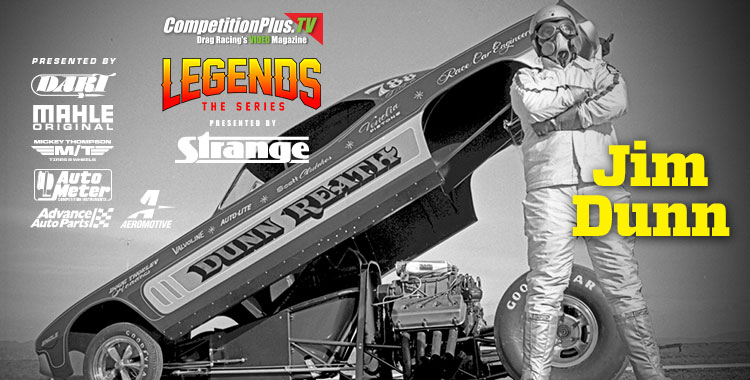 Jim Dunn grew up in Montana, the son of a cowboy and bronc buster. It became clear to his dad, though, that one horsepower wasn’t likely to hold his son’s interest for very long so, after identifying an underlying passion for cars, he bought him a 1939 Ford and, on his 14th birthday, threw in a cam and carburetors with the stipulation that he install them himself. The rest, as they say, is history.
Jim Dunn grew up in Montana, the son of a cowboy and bronc buster. It became clear to his dad, though, that one horsepower wasn’t likely to hold his son’s interest for very long so, after identifying an underlying passion for cars, he bought him a 1939 Ford and, on his 14th birthday, threw in a cam and carburetors with the stipulation that he install them himself. The rest, as they say, is history.
In this episode of Legends: The Series, Season Four, “Big Jim” reflects on 64 years in fuel racing, on winning the 1969 March Meet in a field of 134 fuel dragsters, on his starring turn in the movie Funny Car Summer, on “talking” to his motors, on driving the only rear-engine Funny Car to win an NHRA national event and on why he still is one of the toughest crew chiefs for whom to drive.
Addressing the latter topic, he says “I’m pretty close to a perfectionist when it comes to the car. When (my wife Diane) went to the first race with me she said, ‘you turn into an asshole when you go through the gate. I’ve still got the pin for my hat that says ‘asshole’ that she bought me.”
Often self-deprecating, the former LA fireman marvels at the fact that he once scrapped a ’32 three-window coupe, “chopped and full-fendered without a dent in it” for a Volkswagen he couldn’t even identify but into which he bolted a flathead Lincoln simply in the hope of going faster. He then sighs: “I wish I had the ’32 back.”
So sit back and enjoy tales of Frankie and Kenji, bulls and broncs, packing heat at the Watts riots and how “I don’t take BS from anybody.”
EPISODE SIX - THE LEGEND OF DALE PULDE
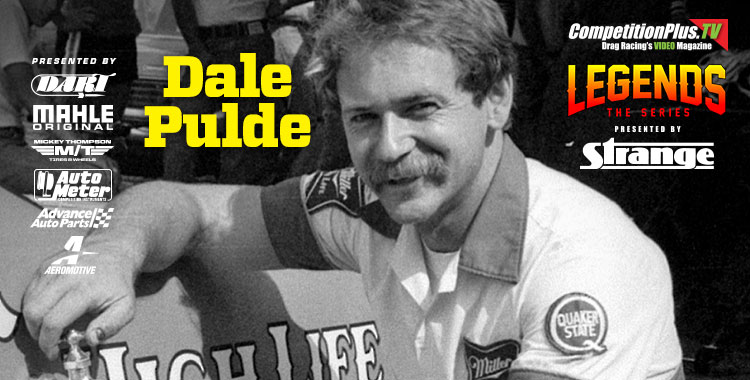
In a career spanning five decades, Dale Pulde drove more than 70 different nitro Funny Cars in NHRA and IHRA tour events, in match races and in the Hot Rod Heritage Series. Considered by many one of the greatest natural driving talents in history, he also was a capable tuner whose cars were known for their reliability and good looks as well as their performance.
In this episode of Legends, the Series, season four, Pulde talks about lessons learned from the late Mickey Thompson, about the death of close friend and mentor Joe Pisano on the day Pulde was to begin driving for him, on “valley fever,” the disease that almost killed him, and on his legacy.
Perhaps the best gauge of Pulde’s success in the old IHRA series is not that he won a record 20 races and three championships (1977, 1982 and 1985) but that he won them against Raymond Beadle, Kenny Bernstein, Mark Oswald, Billy Meyer and Ed McCulloch.
On the NHRA side, he went to the final round of the 1972 Winternationals at the tender age of 21 driving the Steve Montrelli-tuned, 429 Shotgun-powered M/T Ford Pinto, won his first national event in 1978 at Gainesville and won his last at Dallas in 1996 while subbing in the “Smokin’ Joe’s” Ford Mustang for an injured Whit Bazemore.
Most of all, though, Pulde is associated with the “War Eagle” name he and partner Mike Hamby applied to the series of Pontiac, Buick and Dodge Funny Cars they campaigned in the 1970s and 1980s.
So, sit back, buckle up and enjoy a ride that began in quarter midgets and ended in the International Drag Racing Hall of Fame.
EPISODE SEVEN - THE LEGEND OF LARRY DIXON
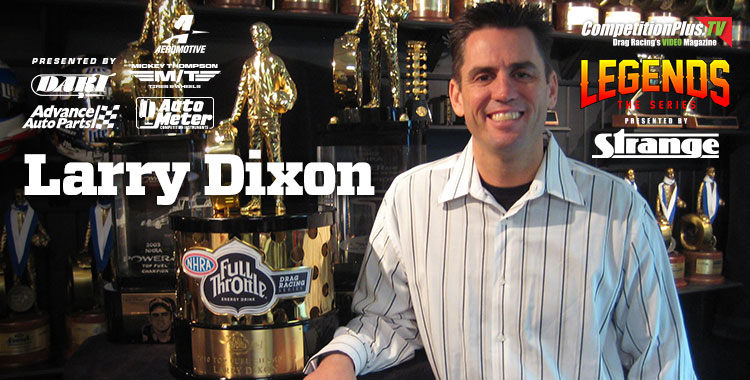 Larry Dixon may not think he’s a legend, but a body of work that includes 62 NHRA tour victories and Top Fuel championships with two different teams in two different decades would suggest otherwise.
Larry Dixon may not think he’s a legend, but a body of work that includes 62 NHRA tour victories and Top Fuel championships with two different teams in two different decades would suggest otherwise.
Regardless, after beating cancer and emerging unscathed from some of the most spectacular accidents in the sport, the California native still is not ready to hang it up.
In this episode of Legends, the Series, season four, Dixon talks about his 20 years with Don “the Snake” Prudhomme, about winning the second pro race in which he ever drove, about the impact of his eventual departure from Snake Racing and about family, faith and life’s every day challenges.
“I had a lot of great cars, great teams, great runs, great jobs,” he says, “and then, not so much, (but) you gotta reset your goals. I’m working on stuff. I’m excited about things I got going on for the future. I don’t know what the future holds for me but whatever’s in store, I’m excited about it and, when I get there, I’ll appreciate it.”
With a candor that has been both a benefit and a bane during his career, Dixon talks about how “being a dad is way cooler than winning a championship,” about the “James Bond moment” he experienced upon first hitting the gas in a Top Fuel dragster and about how he feels safer in a 330 mile-an-hour race car than he does in his pickup truck.
So, settle in and absorb a little homespun wisdom from a man who’s “just out here trying to be a good person and a role model (for my kids),” a man who knows from experience that “every man dies but not every man lives.”
EPISODE EIGHT - THE LEGEND OF AL SEGRINI
 Al Segrini made the most of his short time racing in the NHRA. In fact, in his short career (1974-1984), he ran less than 60 total NHRA tour events. Nevertheless, he won five times, three times in the season-opening Winternationals, and his impact on the sport of drag racing is inescapable.
Al Segrini made the most of his short time racing in the NHRA. In fact, in his short career (1974-1984), he ran less than 60 total NHRA tour events. Nevertheless, he won five times, three times in the season-opening Winternationals, and his impact on the sport of drag racing is inescapable.
A protégé of the late, great “Jungle Jim” Liberman, for whom he once worked as a volunteer crew member, cleaning parts and steering the race car back to the pits, Segrini got his start driving the “Boston Shaker” Funny Car for a recovering Kosty Ivanof, who would introduce him to one of the individuals who would change his life, Jim Beattie, the founder of ATI.
The result of their collaboration was the creation of one of the era’s most celebrated Funny Cars, the Kenny Youngblood-designed “Black Magic” Chevy Vega that claimed “Best Appearing” honors in its debut at the 1974 Gatornationals. It’s the same car in which four months later Segrini would win his first major race, the NHRA Summernationals at Englishtown, N.J., with his idol, Liberman, in the other lane.
There followed a stint at the wheel of Fred Castronovo’s Custom Body Enterprises Plymouth Arrow, a sponsorship coup that turned the sport around and, finally, a curtain call at the wheel of Joe Pisano’s Dodge Daytona at the ‘85 Winternationals. Segrini made a short run at Top Fuel, but for the most part was content to ride off into the sunset.
In this episode of Legends, the Series, season four, “Action Al” talks about how “Jungle” shaped his career, about outfitting his crewmembers in matching uniforms for their Gainesville debut, about sharing the stage with Joe Namath and Farrah Fawcett as a pitchman for 1980s’ sponsor Brut/Faberge and about how drag racing has changed – and not always for the better.
So, listen, laugh and learn from one of the sport’s biggest personalities. - Dave Densmore
 Few drag racing flames ever burned brighter than Gary Scelzi’s. In a pro career spanning just 10 full seasons, five in Top Fuel and five in Funny Car, the native Californian won 37 NHRA tour events, three Bud Shootouts and four championships while endearing himself to friends, fans and rivals away from the track with an offbeat sense of humor.
Few drag racing flames ever burned brighter than Gary Scelzi’s. In a pro career spanning just 10 full seasons, five in Top Fuel and five in Funny Car, the native Californian won 37 NHRA tour events, three Bud Shootouts and four championships while endearing himself to friends, fans and rivals away from the track with an offbeat sense of humor.
When he won the 2005 NHRA Funny Car title, he became just the second driver in history to hoist the championship hardware in both fuel categories.
Still, there was a time when he had resigned himself to the fact that he would never get a chance to compete at the sport’s top levels.
Then came the call from Alan Johnson that would change everything. Still mourning the loss of his brother Blaine in a 1996 crash, Johnson was contemplating an eventual return to racing and asked Scelzi if he ever had thought about driving a Top Fuel dragster. The rest is racing history.
They won their first two races together in 1997 and Scelzi went on to win both the Winston Championship and NHRA Rookie of the Year honors. Nevertheless, after two more titles, the wild one’s career hit another speed bump in 2002 when he and Johnson tried to replicate their success in a move to Funny Car.
It would take a move to Don Schumacher Racing to rebuild his confidence, put him back on track and back in the winners’ circle.
In this debut episode of Legends, The Series, season five, Scelzi talks about his early days in sand drag racing, his initial feeling of intimidation in Top Fuel, his awkward departure and how he hopes to be remembered. You’ll want to tune in. This is vintage “Scelzi Says.”
Open invitation to binge watch Season 3, Legends: The Series, especially the episode on Jungle Pam Hardy - https://t.co/kbGn876UFm pic.twitter.com/FFWOJqkzQp
— Competition Plus (@competitionplus) December 24, 2018
How about binge watching Season 2 of Legends: The Series #LEGENDStheSERIES - https://t.co/oYMJHt02mB pic.twitter.com/q1dqm1qJsN
— Competition Plus (@competitionplus) December 18, 2018
Watch the early episodes of #LEGENDStheSERIES, even the "accidental" pilot - https://t.co/tgXxlCoOFS pic.twitter.com/WyDgWyryYs
— Competition Plus (@competitionplus) December 16, 2018









